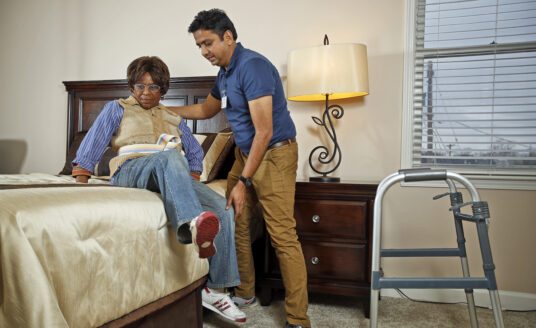If you’re an experienced nurse looking for a new challenge, transitioning to senior care is a move you might find to be especially fulfilling.
As people age, they often need a little bit of extra help to make sure their medications are managed properly and they are able to accomplish activities of daily living. For those in assisted living or skilled nursing communities, having an established relationship with an experienced and knowledgeable healthcare professional is key to maintaining a high quality of life.
It’s a popular decision these days among health professionals to make a change from working in a hospital or clinical setting to becoming a full-time senior care professional. Their decision stems from both practical to personal reasons.
Here are some of the top reasons healthcare workers are switching to senior care:
- It’s one of the fastest growing segments of health care. According to the Pew Research Center, more than 10,000 Americans turn 65 every day since the beginning of 2011. That means there are millions of potential patients adding to demand – and job security – in the senior market. According to the U.S. Bureau of Labor Statistics, the need for home health and personal care aides is expected to increase by 33 percent by the year 2030.
- It’s a great chance for you to advance. While nurses can join the senior care field right out of school, experienced caregivers are especially sought after because our older loved ones often have more complicated medical needs than their younger counterparts. Due to the demand for senior care nurses, your previous experience could make you a strong candidate for a management position – and the financial rewards that come with the promotion – at either the local or corporate level.
- Make more meaningful connections. While the average hospital stay is less than five days long, working in a senior care setting gives nurses a chance to meet and develop relationships with their patients and their families. In addition, while nurses in hospital settings often don’t have the opportunity to follow their patients as they move along the continuum of care, senior care specialists have the rewarding experience of seeing the difference they make in people’s lives.
So, what does it take to be a nurse in a senior care community? In addition to the patience, poise and understanding necessary to develop a mutually beneficial relationship with patients and their families, there are a variety of skills needed to be an excellent caregiver for senior adults.
Responsibilities of geriatric care nurses include:
- Development of treatment plans for elderly patients in collaboration with physicians and other medical professionals.
- Administering medications and medical devices.
- Providing treatment for medical conditions that commonly affect the elderly including arthritis, heart disease, diabetes, and cognitive issues.
- Monitoring for signs of infection, fractures, and other acute health issues in seniors and providing treatment.
- Preparing and reviewing paperwork related to government regulations and insurance claims.
- Educating patients and their caregivers on ways to handle age-related conditions.
Why should you choose Bethesda as your new career home?
Offering several beautiful, award-winning communities where the seniors of the St. Louis area can get the best in care, Bethesda offers its team members the opportunity to be the best they can be. Apart from excellent benefits, you’ll get the chance to be a part of a team that makes a real difference in the lives of the people it serves.
Check out the Bethesda Careers page on our website to find out why you should consider joining our team.
Want to find out more?
If you’d like to stay up to date with Bethesda Health Group, sign up here to receive our blog and newsletters!
"*" indicates required fields
Related Articles
Want to find out more?
If you’d like to stay up to date with Bethesda Health Group, sign up here to receive our blog and newsletters!
"*" indicates required fields



